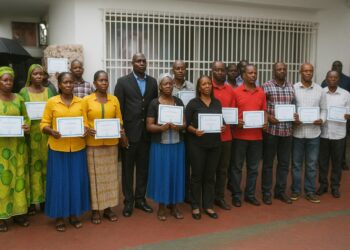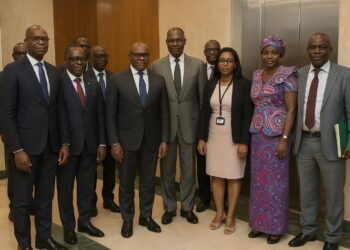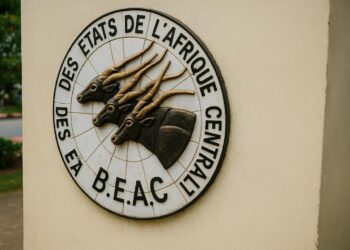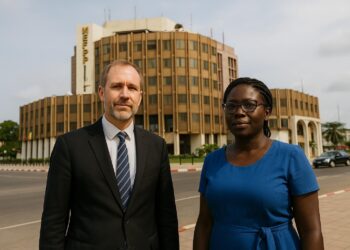Brazzaville wins AfDB flagship gathering
The Republic of Congo took a decisive step toward hosting Africa’s biggest development-finance rendez-vous, signing on 19 September a protocol with the African Development Bank in Brazzaville. The agreement confirms that the 61st Annual Meetings will run from 25 to 29 May 2026 under full Congolese stewardship (AfDB, 19 Sept 2023).
AfDB secretary-general Vincent O. Nmehielle praised the “shared understanding” reached with Minister of Economy, Plan and Regional Integration Ludovic Ngatsé, stressing that clear responsibilities on conferencing, protocol, security and health are now codified. Prime Minister Anatole Collinet Makosso witnessed the ceremony, underlining cabinet-level ownership of the project (Government communiqué, 19 Sept 2023).
Protocol details and compliance duties
The 20-page memorandum lays out procurement rules aligned with AfDB standards. Congo will provide venues, accreditation systems and security per international norms, while the Bank will deploy technical teams and digital platforms. Both parties committed to health-safety guidelines refined during the post-pandemic cycle.
Nmehielle insisted that “working in tandem” is critical in a fraught geopolitical landscape, signalling vigilance on cybersecurity and supply-chain turbulence. He reiterated that the Meetings must remain carbon-conscious, reflecting the AfDB’s 2023–2027 Climate Action Plan (AfDB strategy papers).
Economic stakes for Congo and investors
Hosting 5,000-plus delegates can inject an estimated USD 45 million into hotels, catering, transport and creative industries, according to AfDB event impact averages. Service providers are already scouting opportunities in conferencing gear, broadband upgrades and executive transport.
For international financiers, Brazzaville offers proximity to the USD 226 billion Gulf of Guinea market and to mineral corridors linking Gabon, Cameroon and the DRC. Analysts at Ecobank Research view the Meetings as a “shop window” for pipeline projects in power interconnection, timber processing and digital infrastructure (Ecobank note, Oct 2023).
Infrastructure readiness agenda
The government plans targeted refurbishments rather than grandiose builds, aligning with fiscal-consolidation commitments under its 2022 IMF Extended Credit Facility. The Palais des Congrès will undergo a fiber-optic overhaul, while Maya-Maya airport eyes a second VIP lounge to streamline delegate flow.
Public-private partnerships are encouraged for hotel capacity. The Makosso cabinet has floated tax holidays on imported fit-out equipment and fast-track customs for green building materials, signalling continuity with Congo’s 2021 investment code updates.
Financing the Meetings responsibly
Minister Ngatsé framed the event as “budget-neutral over the medium term.” Direct outlays, estimated at XAF 32 billion, will be offset by rises in tourism receipts and local tax collection. The treasury intends to ring-fence spending within the 2025 and 2026 finance laws to preserve debt-service ratios.
The AfDB will co-finance specific digital platforms and translation services, while multilateral partners such as the World Health Organization have been approached for in-kind contributions on sanitary protocols, insiders confirm.
Regional integration pivot point
Brazzaville 2026 coincides with the second implementation phase of the African Continental Free Trade Area. Congo positions itself as a logistics hub on the Pointe-Noire–Ouesso corridor, aiming to leverage AfDB visibility to accelerate the long-planned dry port at Dolisie.
Central African Economic and Monetary Community officials say the Meetings could expedite harmonisation of customs data across Cameroon, Gabon and Congo, reducing transit times by up to 30 percent. That agenda dovetails with the AfDB’s flagship Central Corridor Programme.
Climate and forest diplomacy spotlight
Congo’s hosting offer emphasised its stewardship of the Congo Basin forests. Authorities intend to stage a side-event on carbon-credit standardisation, bringing together sovereign issuers and private registries. The AfDB’s Congo Basin Fund, approved in 2022, is expected to announce allocations during the Meetings.
Environmental NGOs welcomed the focus but will watch procurement choices for alignment with low-emission targets. Government advisers argue the event can showcase sustainable timber certification schemes already piloted with the Programme de Promotion de la Gestion Durable des Forêts.
Business matchmaking prospects
AfDB’s Private Sector Department plans a Deal Room where project sponsors can pitch to institutional investors. Sectors highlighted include renewable mini-grids, agritech logistics and fintech platforms targeting the regional SME gap estimated at USD 8 billion.
Local banks expect short-term credit demand for service contracts, and COBAC regulators have signalled readiness to grant temporary capital-adequacy waivers, provided exposures remain under 15 percent of tier-one capital.
Security and health considerations
The protocol tasks the National Police with perimeter security, supported by AfDB’s Corporate Services and Safeguards Department. International standard operating procedures, including ISO 45001 for event safety, will be adopted.
On health, Congo’s Ministry of Public Health will integrate event surveillance into its digital Integrated Disease Monitoring platform, drawing lessons from its 2021 COVID-19 vaccination drive, which achieved 30 percent coverage.
Human capital and diaspora engagement
Organisers aim to tap the Congolese diaspora for volunteer interpreters and digital-media managers, citing successful precedents during the 2019 Francophonie Games in Kinshasa. Scholarships for local hospitality-school students will be announced alongside the Meetings, reinforcing skills transfer ambitions.
The AfDB’s Jobs for Youth in Africa initiative may pilot a training module in Brazzaville, linking event management skills to longer-term employability outcomes across Central Africa.
Tracking milestones toward May 2026
A joint steering committee meets quarterly, with the first roadmap review slated for January 2024. Key deliverables include venue readiness audits, a cybersecurity stress test and an environmental-impact assessment.
Progress will be published on a dedicated portal carrying dashboards on budget execution, contract awards and carbon footprint, aligning with the AfDB’s Transparency Charter adopted in 2021.
Signals to the sovereign debt market
Successfully delivering the Meetings could fortify Congo’s credit narrative as it eyes a potential Eurobond refinancing in 2025. Fitch upgraded the republic’s outlook to Stable in July 2023, citing fiscal consolidation and oil-price gains. Demonstrating organisational rigour would reinforce that trajectory.
Debt analysts at Renaissance Capital argue that high-visibility events can reassure investors about administrative capacity, a soft metric increasingly embedded in ESG assessments (Renaissance note, Sept 2023).
Broader message to multilateral partners
By offering a neutral convening ground, Brazzaville signals readiness to serve as a diplomatic bridge within Central Africa. UN Economic Commission for Africa sources hint at scheduling their 2026 Regional Forum on Sustainable Development back-to-back with the AfDB Meetings to maximise synergies.
Such clustering could lower participation costs for smaller states and amplify policy coherence on energy transition and digital trade.
Balancing ambition and realism
Observers recall that Equatorial Guinea’s 2019 AfDB Meetings faced last-minute logistical strains despite significant spending. Congo’s approach of incremental upgrades seeks to avoid similar pitfalls while aligning with IMF-backed fiscal prudence.
Minister Ngatsé summed up the philosophy: “We will deliver an event worthy of Africa without overextending our means,” he told reporters after the signing.
Next policy steps
Cabinet approval of the Events Facilitation Bill, expected in March 2024, will formalise tax incentives and procurement ceilings specific to the Meetings. Stakeholders are invited to public consultations in Brazzaville and Pointe-Noire over the coming weeks.
AfDB technical missions will conduct a second site assessment mid-2024, focusing on digital infrastructure redundancy and emergency medical pathways.
What success would look like
A seamless delegate experience, timely financial closeout and measurable carbon offsets would mark the Meetings as a continental benchmark. For Congo, the legacy would be enhanced infrastructure, improved sovereign-risk perception and a stronger claim to regional-hub status.
For AfDB shareholders, a well-orchestrated Brazzaville summit would demonstrate operational resilience and stakeholder inclusivity at a time of heightened global uncertainty.
Outlook
With the protocol now signed, Congo enters a three-year sprint balancing logistical rigour and fiscal caution. If milestones are met, May 2026 could crystallise Brazzaville’s aspiration to anchor Central Africa’s integration while projecting a confident, climate-conscious narrative to investors and partners alike.











































